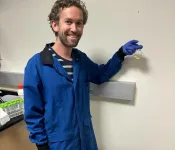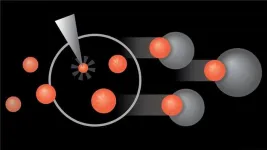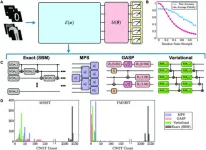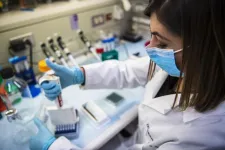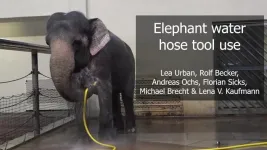(Press-News.org) A new EU joint research project led by the University of Göttingen will explore how migration, demographic change and current crises are affecting social cohesion and democratic structures in Europe. A key objective is to find out how resilient democratic structures can strengthen local communities in times of profound demographic change. The project “Identities - Migration - Democracy (We-ID)” has been awarded funding of around three million euros over three years by the European Union.
European societies are undergoing a profound demographic transformation: falling birth rates, rising life expectancy and migration are increasingly shaping the proportion of people in different age groups, ethnic diversity and cultural identities. At the same time, challenges such as climate change, the Covid-19 pandemic along with the associated economic crisis, the war in Ukraine and the crisis of the rule of law are putting pressure on Europe’s integration processes. These crises are exacerbating lines of conflict that often run along issues of identity and democracy.
“We plan to research how to lay the foundations for long-term strategies to give European communities the resilience they need to meet current challenges and strengthen democratic values,” explains project leader Claudia Neu, Professor of Rural Sociology at the Universities of Göttingen and Kassel. “The cohesion of our society will depend crucially on how well we can utilise the potential of a diverse population while promoting stable, democratic structures locally. This is the only way to prevent these changes from becoming a threat to democracy in Europe.”
The research takes into account both the effects of migration on the host communities and the changes in the identity of migrants and their descendants. In addition to comprehensive data analyses on migration and political participation, case studies are being conducted in the participating countries to better understand the conditions for resilient democratic communities. The project will create a new platform – called the Policy, Advocacy and Research Lab – to facilitate exchange between academia, politics and society. In addition, a toolbox with practical recommendations for local stakeholders and practitioners is being developed.
The project partners are the University of St Andrews in Scotland, the Bocconi University in Italy, the Institute for the Study of Population and Human Studies (Bulgaria), and the Institute of Social Sciences Ivo Pilar (Croatia), as well as Population Europe (Max Planck Society), the Council of the Baltic Sea States, and the non-governmental organisation The Civics Innovation Hub. Further information can be found here: https://cordis.europa.eu/project/id/101177925
Contact:
Professor Claudia Neu
University of Göttingen
Rural Sociology
Platz der Göttinger Sieben 5
37073 Göttingen, Germany
Tel: +49 (0)551 39-24804
Email: claudia.neu@uni-goettingen.de
www.uni-goettingen.de/en/148839.html
A new EU joint research project led by the University of Göttingen will explore how migration, demographic change and current crises are affecting social cohesion and democratic structures in Europe. A key objective is to find out how resilient democratic structures can strengthen local communities in times of profound demographic change. The project “Identities - Migration - Democracy (We-ID)” has been awarded funding of around three million euros over three years by the European Union.
European societies are undergoing a profound demographic transformation: falling birth rates, rising life expectancy and migration are increasingly shaping the proportion of people in different age groups, ethnic diversity and cultural identities. At the same time, challenges such as climate change, the Covid-19 pandemic along with the associated economic crisis, the war in Ukraine and the crisis of the rule of law are putting pressure on Europe’s integration processes. These crises are exacerbating lines of conflict that often run along issues of identity and democracy.
“We plan to research how to lay the foundations for long-term strategies to give European communities the resilience they need to meet current challenges and strengthen democratic values,” explains project leader Claudia Neu, Professor of Rural Sociology at the Universities of Göttingen and Kassel. “The cohesion of our society will depend crucially on how well we can utilise the potential of a diverse population while promoting stable, democratic structures locally. This is the only way to prevent these changes from becoming a threat to democracy in Europe.”
The research takes into account both the effects of migration on the host communities and the changes in the identity of migrants and their descendants. In addition to comprehensive data analyses on migration and political participation, case studies are being conducted in the participating countries to better understand the conditions for resilient democratic communities. The project will create a new platform – called the Policy, Advocacy and Research Lab – to facilitate exchange between academia, politics and society. In addition, a toolbox with practical recommendations for local stakeholders and practitioners is being developed.
The project partners are the University of St Andrews in Scotland, the Bocconi University in Italy, the Institute for the Study of Population and Human Studies (Bulgaria), and the Institute of Social Sciences Ivo Pilar (Croatia), as well as Population Europe (Max Planck Society), the Council of the Baltic Sea States, and the non-governmental organisation The Civics Innovation Hub. Further information can be found here: https://cordis.europa.eu/project/id/101177925
Contact:
Professor Claudia Neu
University of Göttingen
Rural Sociology
Platz der Göttinger Sieben 5
37073 Göttingen, Germany
Tel: +49 (0)551 39-24804
Email: claudia.neu@uni-goettingen.de
www.uni-goettingen.de/en/148839.html
END
Cohesion through resilient democratic communities
New EU project ‘We-ID’ starts at Göttingen University in February 2025
2024-11-08
ELSE PRESS RELEASES FROM THIS DATE:
UC Santa Cruz chemists discover new process to make biodiesel production easier, less energy intensive
2024-11-08
UC Santa Cruz chemists have discovered a new way to produce biodiesel from waste oil that both simplifies the process and requires relatively mild heat. This discovery has the potential to make the alternative fuel source much more appealing to the massive industrial sectors that are the backbone of the nation’s economy.
In 2022, the U.S. transportation sector alone used about 3 million barrels of diesel per day, accounting for about 75% of total consumption of the fuel in this country. That same year, ...
MD Anderson launches Institute for Cell Therapy Discovery & Innovation to deliver transformational new therapies
2024-11-08
HOUSTON ― The University of Texas MD Anderson Cancer Center today announced the launch of its Institute for Cell Therapy Discovery & Innovation, which will build upon longstanding MD Anderson clinical and research expertise to lead the world in developing and advancing impactful cell therapies for patients in need.
The institute will bring together top scientists and clinicians to lead exceptional discovery, translational and clinical research that will deliver new insights in immunology and cell engineering, fueling the creation of transformational new treatments that can be rapidly adapted to address emerging needs in cancer, autoimmune diseases, infections ...
New quantum encoding methods slash circuit complexity in machine learning
2024-11-08
A recent study by researchers from CSIRO and the University of Melbourne has made progress in quantum machine learning, a field aimed at achieving quantum advantage to outperform classical machine learning. Their work demonstrates that quantum circuits for data encoding in quantum machine learning can be greatly simplified without compromising accuracy or robustness. This research was published Sept.12 in Intelligent Computing, a Science Partner Journal.
The team’s results, validated through both simulations and experiments on IBM quantum devices, show that their innovative encoding methods reduced circuit ...
New research promises an unprecedented look at how psychosocial stress affects military service members’ heart health
2024-11-08
A University of Massachusetts Amherst researcher will examine the role of cumulative psychosocial stress – as well as race, ethnicity and gender – among U.S. military personnel to gauge their impact on cardiovascular health and healthcare utilization.
The study is funded with a $1 million grant from the Defense Health Agency, part of the Department of Defense (DoD). The findings will help the military develop programs for health promotion and health readiness for active duty and Reserve/National ...
Faster measurement of response to antibiotic treatment in sepsis patients using Dimeric HNL
2024-11-08
The biomarker human neutrophil lipocalin HNL, which was previously shown to be a useful indicator of bacterial infections, may also in the form of Dimeric HNL be used to effectively monitor the success of antibiotic treatment in sepsis. The first promising results in this regard were published in 2019 and now the research group has confirmed these results in a larger study. The study is published in the journal PLOS ONE.
Sepsis, the costliest disease to health care, is a life-threatening condition with high mortality if not diagnosed and ...
Cleveland Clinic announces updated findings in preventive breast cancer vaccine study
2024-11-08
November 8, 2024, CLEVELAND: Cleveland Clinic researchers are presenting updated findings from their novel study of a vaccine aimed at preventing triple-negative breast cancer, the most aggressive and lethal form of the disease.
The study team found that the investigational vaccine was generally well tolerated and produced an immune response in most patients. The team described the side effects of the vaccine, showed the highest tolerated dose to date, and presented the immunologic effects of the vaccine. Findings are being presented at the Society for Immunotherapy of Cancer Annual Meeting.
Launched in 2021 and funded by the U.S. Department of Defense, the ongoing ...
Intergenerational effects of adversity on mind-body health: Pathways through the gut-brain axis
2024-11-08
The Brain & Behavior Research Foundation (BBRF) is hosting a free webinar, “Intergenerational Effects of Adversity on Mind-Body Health: Pathways Through the Gut-Brain Axis” on Tuesday, November 12, 2024, at 2:00 pm ET. The presenter, Bridget Laura Callaghan, Ph.D., is an Assistant Professor in the Department of Psychology at the University of California, Los Angeles (UCLA). At UCLA, Dr. Callaghan directs the Brain & Body Lab in the Department of Psychology and also heads the Mental Disorders and Pain research theme at the Goodman Luskin Microbiome Center. The webinar host, Jeffrey Borenstein, M.D., is the President ...
Watch this elephant turn a hose into a sophisticated showering tool
2024-11-08
Tool use isn’t unique to humans. Chimpanzees use sticks as tools. Dolphins, crows, and elephants are known for their tool-use abilities, too. Now a report in the Cell Press journal Current Biology on November 8, 2024, highlights elephants’ remarkable skill in using a hose as a flexible shower head. As an unexpected bonus, researchers say they also have evidence that a fellow elephant knows how to turn the water off, perhaps as a kind of “prank.”
“Elephants are amazing with hoses,” says Michael Brecht ...
Chimpanzees perform better on challenging computer tasks when they have an audience
2024-11-08
When people have an audience watching them, it can change their performance for better or worse. Now, researchers reporting in the Cell Press journal iScience on November 8 have found that chimpanzees’ performance on computer tasks is influenced by the number of people watching them. The findings suggest that this “audience effect” predates the development of reputation-based human societies, the researchers say.
“It was very surprising to find that chimpanzees are affected in their task performance by ...
New medical AI tool identifies more cases of long COVID from patient health records
2024-11-08
KEY TAKEAWAYS
Researchers from Mass General Brigham are leveraging artificial intelligence to help identify the signs of long COVID, track how different symptoms manifest over time, and eliminate alternative explanations for patients’ symptoms.
The new approach suggests that 22.8% of the population experience the symptoms of long COVID, a figure that may paint a more realistic picture of the pandemic’s long-term toll.
Through analyzing a patient’s history over time, this new AI tool ...
LAST 30 PRESS RELEASES:
EANM launches new award to accelerate alpha radioligand therapy research
Globe-trotting ancient ‘sea-salamander’ fossils rediscovered from Australia’s dawn of the Age of Dinosaurs
Roadmap for Europe’s biodiversity monitoring system
Novel camel antimicrobial peptides show promise against drug-resistant bacteria
Scientists discover why we know when to stop scratching an itch
A hidden reason inner ear cells die – and what it means for preventing hearing loss
Researchers discover how tuberculosis bacteria use a “stealth” mechanism to evade the immune system
New microscopy technique lets scientists see cells in unprecedented detail and color
Sometimes less is more: Scientists rethink how to pack medicine into tiny delivery capsules
Scientists build low-cost microscope to study living cells in zero gravity
The Biophysical Journal names Denis V. Titov the 2025 Paper of the Year-Early Career Investigator awardee
Scientists show how your body senses cold—and why menthol feels cool
Scientists deliver new molecule for getting DNA into cells
Study reveals insights about brain regions linked to OCD, informing potential treatments
Does ocean saltiness influence El Niño?
2026 Young Investigators: ONR celebrates new talent tackling warfighter challenges
Genetics help explain who gets the ‘telltale tingle’ from music, art and literature
Many Americans misunderstand medical aid in dying laws
Researchers publish landmark infectious disease study in ‘Science’
New NSF award supports innovative role-playing game approach to strengthening research security in academia
Kumar named to ACMA Emerging Leaders Program for 2026
AI language models could transform aquatic environmental risk assessment
New isotope tools reveal hidden pathways reshaping the global nitrogen cycle
Study reveals how antibiotic structure controls removal from water using biochar
Why chronic pain lasts longer in women: Immune cells offer clues
Toxic exposure creates epigenetic disease risk over 20 generations
More time spent on social media linked to steroid use intentions among boys and men
New study suggests a “kick it while it’s down” approach to cancer treatment could improve cure rates
Milken Institute, Ann Theodore Foundation launch new grant to support clinical trial for potential sarcoidosis treatment
New strategies boost effectiveness of CAR-NK therapy against cancer
[Press-News.org] Cohesion through resilient democratic communitiesNew EU project ‘We-ID’ starts at Göttingen University in February 2025
